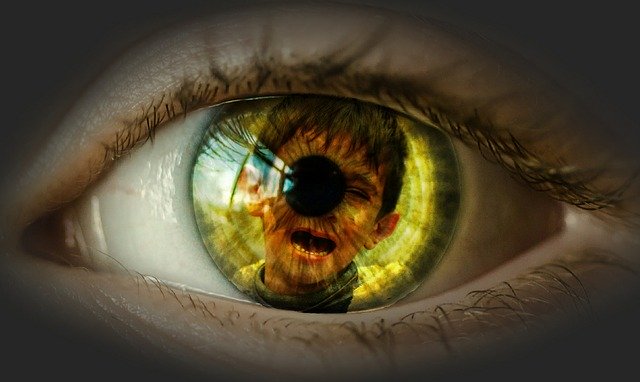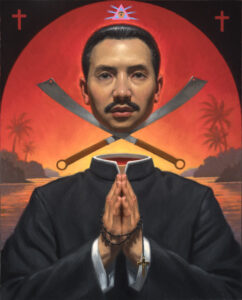But Jesus said to them: “Suffer the little children, and forbid them not to come to me: for the kingdom of heaven is for such.”
—Matthew 19:14
“Evil,” wrote Flannery O’Connor, “is not a problem to be solved but a mystery to be endured.” Pains can either be borne in emulation of Christ crucified or they can be borne bitterly, like arbitrary afflictions lacking meaning and mystery.
Dana Gioia, the poet and public intellectual who has done more than any other living figure to galvanize the Catholic literary tradition, prompts this either / or in a number of his poems, not a few of which unveil him as no stranger to suffering. Gioia, once a business executive and former Chairman of the National Endowment for the Arts, acquired a keen knowledge of loss when in December of 1987 his four-month-old son Michael Jasper died of sudden infant death syndrome.
As he said after the death, “I saw poetry differently. Writing took on a spiritual urgency I had never experienced before.” Often this urgency leads us through hellish landscapes, lairs of despair. And yet, as Janet McCann observes, if Gioia’s poetry can be dark, it “isn’t nihilistic, nor is it unforgiving.” “Special Treatments Ward” is one striking example. In this poem, the narrator’s reduced state leaves the reader rattled; the suffering of innocents has left him lost. Taken as a whole, however, the poem elevates us above this world’s ceiling, ameliorating our losses through the dead children’s healing.
“So this is where the children come to die.” The narrator’s opening line straddles that border between accusatory and melancholic, demanding that we see and know the pain of these little ones—that we draw out the pain from where we have “hidden” it. The irony is evident: that which occupies the highest place is the most harrowing. While the upper levels of a high rise may signal prestige or importance, hospital height suggests “out of sight.”
The children are not the only ones who are medicated to assuage their torment: we who go to such lengths to conceal the trials of children are striving for a kind of architecture of anesthetization. T.S. Eliot pierces the vein of this problem in Four Quartets: “human kind / Cannot bear very much reality.” As he mourns the unsettling juxtapositions manifest in the suffering children and their kin, the narrator grows still more paralyzed. Look at the way these “bald and pale” little ones “lie in bright pajamas . . . / watching another world on a screen.” Look at the doctors coming and going “like oracles, / their manner cool, omniscient, and oblique.” Look at the mothers who sleep in awkward strain “beside their children, as if they might mesh / those small bruised bodies back into their flesh.” Mornings “prove” their “love so strong” incapable of protecting their vulnerable young.
The poem’s appeal to the suffering of children finds its literary prototype in Dostoevsky’s The Brothers Karamazov, when Ivan, elder brother of the pious Alyosha’s cites childhood suffering as his reason for refusing to serve God. Although an abused child’s mother may one day cry out “Just art thou, O Lord!” Ivan insists that he will not join the chorus, for future glories are “not worth one little tear of even that one tormented child who beat her chest with her little fist and prayed to ‘dear God’ in a stinking outhouse with her unredeemed tears.”
Whereas Ivan’s resistance to redemption makes him effusive, the narrator of Gioia’s poem grows silent under sorrows. For twelve years, he doubts his right to “speak for those who died.” As he has “lost one child” and seen another in jeopardy, he refused, for a time, to revisit the incident. His initial object is to “suture shut these wounds” with “well-stitched words,” an effort interrupted by his recognition that words could not achieve such an end, and that “Whatever strength the task required [he] lacked.”
Here one is reminded of Dante’s infernal sublime—the poet’s inability to do the realities of Hell justice with mere words; some things are so awful they are ineffable. As Dante writes in Canto XXXII of The Inferno, he lacks “rhymes as harsh and horrible / as the hard fact of that final dismal hole / which bears the weight of all the steeps of Hell.” To “describe the bottom of the Universe” is “no easy undertaking . . . nor is it for tongues that only babble child’s play.”
Though silenced by what he saw at the top of this world’s towers, the narrator continues to be tormented by the children, who play with his sprained mind. At least, this is how he conceives of their visits, which occur “not just in dream.” His assertion of the children’s actual appearance raises the stakes, for such a supernatural occurrence implies divine intent. But “Why do they seek [him]?” and, when they come, why do they do so “suddenly, silently— / insistent, unprovoked, unwelcome”?
Would the narrator be better able to grasp the reason for their visit if he did not withhold welcome?
The latter question gives us occasion to distance ourselves from his reaction. His troubled state seems to grow out of the fact that he thinks they seek his help (“What use am I to them, almost a stranger?”). Like Dante in the early echelons of the inferno, the narrator has not learned how to rightly respond to the anguished.
Whereas Dante often fails through committing acts of misguided mercy toward sinners who do not merit it, the narrator’s mistake here is to assume that the departed need his blessing (“And vagrant sorrow cannot bless the dead”). What he fails to consider is that the children may come to bless him—by making palpable their purified (if still-marred) state. If so, all that they mean to communicate should be ascertainable, in spite of their silence, through their very appearance:
This passage unmistakably alludes to the wounds of Christ, which he still bears after his resurrection. Thomas, who put his hands into these wounds, refuses to believe unless he sees. Gioia’s narrator fails to believe because he sees. That is, the narrator’s terrified interpretation of the children seems contingent on the fact that their lesions remain.
It is true that they are unbound from their bandages, which they previously wore like denigrating “uniforms,” but this shedding reveals the lesions—recalls former sickness. Mysteriously, the children he recognizes are “untouched by years / . . . their faces pale and gray / like ashes fallen from a distant fire.”
While “ashes” connote mortality, their alteration by fire suggests purgatorial purification—a promise to which the narrator is oblivious.
In his reading of The Brothers Karamazov, Romano Guardini contends that Ivan’s violent rebellion is only superficially tied to his purported care for children. Ivan rejects the world as it is because he “loves, with all his sick neuroticism, the evil that he rejects in it.” This disordered love dismantles the apparent potency of Ivan’s rebellion.
If the narrator of “Special Treatments Ward” lacks Ivan’s pathological extremity, the poem makes plain his affinity with the troubled Karamazov’s fixations. In one sense the narrator goes even further than Ivan: he believes that he must be the healer-savior. Passing through “Special Treatments Ward,” the reader is pained by the narrator’s obtuse air—an obliqueness who among us doesn’t share?
But Gioia gives us children who, if not made whole, are more than healed. They are “risen.”
He brings us evidence of a wholly other hospital where, in T.S. Eliot’s words, “The wounded surgeon plies the steel / That questions the distempered part; / Beneath the bleeding hands we feel / The sharp compassion of the healer’s art.”
Joshua Hren is the editor of Wiseblood Books, and the author of the just-released book of short stories “In the Wine Press” which is available on Amazon.
Editor’s note: Dana Gioia’s poem “Special Treatments Ward” may be read in its entirety here: https://www.poetryfoundation.org/poetrymagazine/poems/54650/special-treatments-ward




